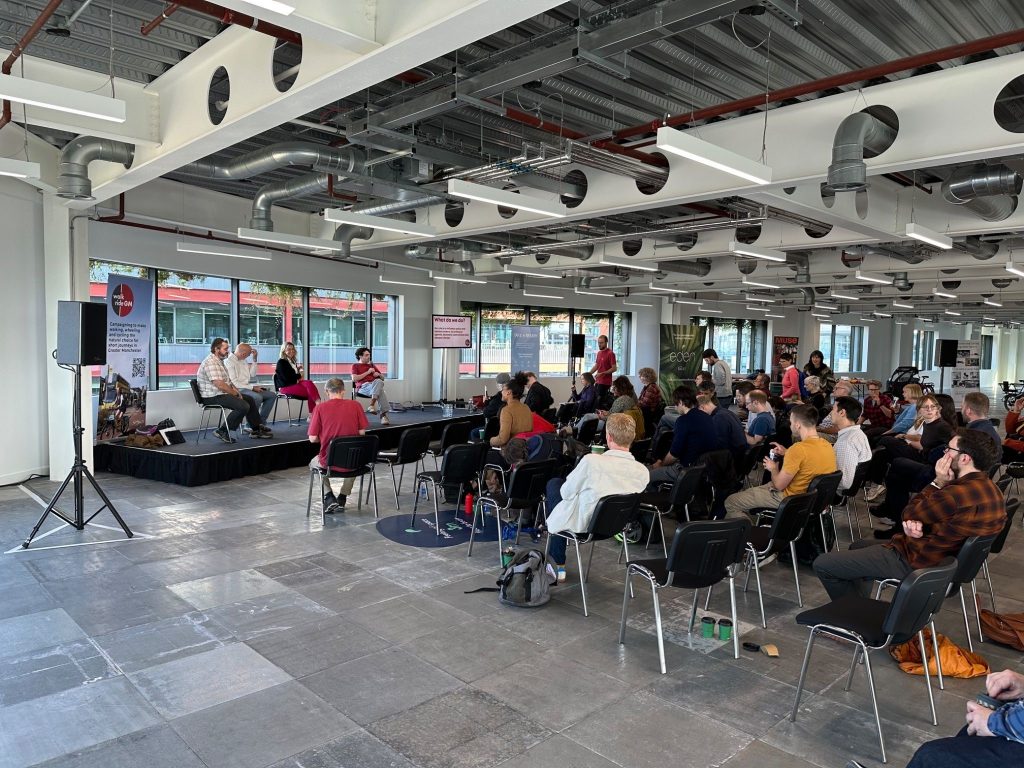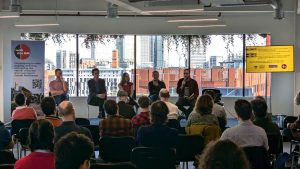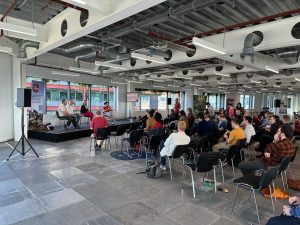
Cycling policy and practice in Greater Manchester: Between ambitious plans and the realities of delivery | Thomas van Laake & Graeme Sherriff
Authors Thomas van Laake (University of Manchester) and Graeme Sherriff (University of Salford) reflect on the challenges of putting active travel policy into practice in Greater Manchester and discussions at a recent event co-hosted by Manchester Urban Institute, University of Salford and Walk Ride GM.
Delivering 1,800 miles of ‘world-class walking and cycling infrastructure’.
An aim to become ‘the very first city region [with] a fully joined up cycling and walking network’.
Manchester named 2024 ‘European Capital of Cycling’.
When it comes to promoting cycling, Greater Manchester has not been held back by a lack of ambition.
Enabled by new modes of governance brought on by devolution, the city region’s transportation authority, Transport for Greater Manchester (TfGM), has developed a comprehensive approach to promoting active travel as part of a wider integrated ‘Bee Network’ system. However, nearly seven years on from the launch of the transformative ‘Made to Move’ strategy, the significant challenges the city region faces in achieving this vision are becoming clear. Despite a series of policy initiatives and the historic opportunity for mode shift during the pandemic, cycling mode share has stagnated at 2%, far below the 10% target for 2025 set by the Greater Manchester Cycling Strategy in 2014. Meanwhile, infrastructure delivery has often been piecemeal and delayed, hamstrung by political opposition to any reduction in parking spaces and motor vehicle throughput.
 Yet while the enthusiasm and bravado around a cycling transformation has dimmed somewhat, the targets and policies remain in place, and ever more streets and neighbourhoods are seeing changes ranging from school streets to CYCLOPS junctions. Seeking to critically evaluate the progress of these developments, Walk Ride GM, the University of Salford, and the Manchester Urban Institute co-organized a conference on cycling policy and practice in Greater Manchester. This event, held on the 5th of October 2024, brought together a diverse group of policymakers, advocates, and researchers concerned with cycling for transport to reflect on and learn from past successes and failures and discuss future pathways and prospects.
Yet while the enthusiasm and bravado around a cycling transformation has dimmed somewhat, the targets and policies remain in place, and ever more streets and neighbourhoods are seeing changes ranging from school streets to CYCLOPS junctions. Seeking to critically evaluate the progress of these developments, Walk Ride GM, the University of Salford, and the Manchester Urban Institute co-organized a conference on cycling policy and practice in Greater Manchester. This event, held on the 5th of October 2024, brought together a diverse group of policymakers, advocates, and researchers concerned with cycling for transport to reflect on and learn from past successes and failures and discuss future pathways and prospects.
One major themes across the panels and discussions was how to address inequalities and work across different contexts. Speaking from personal experience as a woman of South Asian hertitage working to promote cycling in Cheetham Hill, Naz Khan underlined the barriers to cycling faced by marginalized groups in deprived areas. The delivery of infrastructure on higher-demand corridors such as Oxford Road and the Chorlton Cycleway has compounded these disparities; as Naz summarized, ‘Manchester has improved, Cheetham Hill hasn’t’. This raises the ‘chicken or egg’ problem faced by cycling promoters – should infrastructure be prioritized in areas with higher demand, or be used to grow demand in areas without much cycling? Adam Towers, Project Officer at Wigan Council, was open about how local authorities might adapt to different conditions and population needs through strategically selecting and adapting projects. Rather than simply replicate ‘what works’ in the city centre, Greater Manchester’s outer boroughs, particularly North West Greater Manchester, might be best suited by a different approach, such as investing in bicycle libraries or prioritizing off-road paths. This perspective could prove a crucial corrective to calls to further standardise and homogenise cycling interventions across the city region.
Across the panels, most speakers concurred that achieving transformative change hinges on recognizing and responding to the lived experience of residents in consultation processes, as well as developing positive narratives that can counter community distrust ranging from mundane business concerns to conspiracy theories. However, this takes time, and the impatience felt and expressed by many audience members was palpable. Addressing these concerns, Claire Stocks, an experienced campaigner and a founder ofWalk Ride GM, emphasized that a better understanding of problems can inform the formulation of more suitable solutions. This call for positive, results-oriented campaigning was underlined by the various councillors in attendance, with Eve Holt, a former Manchester councillor, positioning ‘action as the antidote to despair’. Cycling advocates were encouraged to go beyond their comfort zone and seek to build alliances with those not currently convinced about the benefits of cycling promotion. Here, John Townsend of ARUP reminded the audience that the ultimate goal of cycling policies should be to improve communities, rather than implementing infrastructure for its own sake.
Nonetheless, getting useful infrastructure in the ground remains critical to achieving durable change. With various audience members denouncing the poor quality of many schemes, public sector officials on the panels were put on the defensive. While conceding that design quality is often lacking and mistakes have been made, Catriona Swanson of MCC and Adam Towers emphasized the importance of capacity and continuity of council staff in order to learn from and improve on mistakes in previous projects. Catriona highlighted the value of local planning documents, such as Salford’s Cycling Network Plan, in enabling decisive action when opportunities arise, such as during the Covid-19 pandemic; it will be interesting to see how she leverages Manchester’s new Active Travel Strategy in her new role at MCC. Meanwhile, Adam highlighted the common problem faced by all active travel teams across Greater Manchester: the ‘bitty’, discontinuous grant funding model that forces local planners to dedicate much of their time to bidding for cash rather than strategizing, engaging with residents, and delivering projects. The potential for a future ‘single settlement’ devolution deal holds promise for longer-term planning horizons, but also highlights the shifting balance of power and responsibility between national, city region, and local governments.
 Over a day of productive interchange between planners, advocates, politicians and concerned citizens, a picture emerged of a more mature and clear-eyed cycling movement in Greater Manchester. With less talk of sky-high ambition, and more attention to the details of delivery, a path is opened to accumulate small wins and create a ‘snowball’ effect that builds on the successes of cycling in Central and South Manchester while also addressing inequalities and differences across the entire conurbation.
Over a day of productive interchange between planners, advocates, politicians and concerned citizens, a picture emerged of a more mature and clear-eyed cycling movement in Greater Manchester. With less talk of sky-high ambition, and more attention to the details of delivery, a path is opened to accumulate small wins and create a ‘snowball’ effect that builds on the successes of cycling in Central and South Manchester while also addressing inequalities and differences across the entire conurbation.
If you want to get involved with advocacy and put pressure on decision makers to delivering for Active Travel in Greater Manchester, then please consider getting involved with or donating to Walk Ride GM.

0 Comments